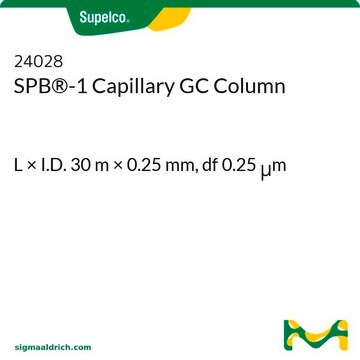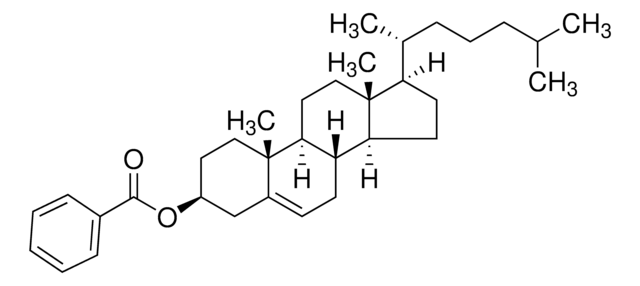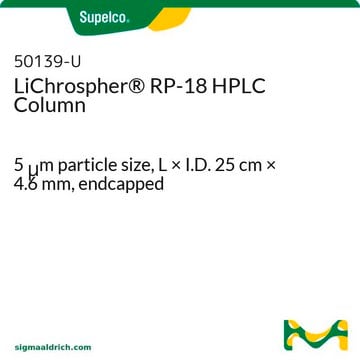Összes fotó(1)
Fontos dokumentumok
23304-U
SPB®-1 Capillary GC Column
L × I.D. 60 m × 0.25 mm, df 3.00 μm
Bejelentkezésa Szervezeti és Szerződéses árazás megtekintéséhez
Összes fotó(1)
About This Item
UNSPSC kód:
12000000
eCl@ss:
32119290
NACRES:
SB.54
Javasolt termékek
material
fused silica
Minőségi szint
Ügynökség
meets requirements for USP G1, G2, and G9
parameter
-60-300 °C temperature (isothermal or programmed)
Béta-érték
21
df
3.00 μm
technika/technikák
gas chromatography (GC): suitable
H × belső átmérő
60 m × 0.25 mm
mátrix aktív csoport
Bonded; poly(dimethyl siloxane) phase
oszloptípus
capillary non-polar
Looking for similar products? Látogasson el ide Útmutató a termékösszehasonlításhoz
Általános leírás
Application: This column is often used for traditional general purpose applications, where a non-polar column is required. Analytes will be separated primarily according to boiling point.
USP Code: This column meets USP G1, G2, and G9 requirements.
Phase:
USP Code: This column meets USP G1, G2, and G9 requirements.
Phase:
- Bonded
- Poly(dimethyl siloxane)
- ≤0.32 mm I.D., <2 μm: -60 °C to 320 °C (isothermal or programmed)
- ≤0.32 mm I.D., ≥2 μm: -60 °C to 300 °C (isothermal or programmed)
- ≥0.53 mm I.D., <2 μm: -60 °C to 300 °C (isothermal) or 320 °C (programmed)
- ≥0.53 mm I.D., ≥2 μm: -60 °C to 260 °C (isothermal) or 280 °C (programmed)
Alkalmazás
SPB®-1 capillary GC column may be used for herbicide determination using In-tube Solid-phase microextraction (SPME).
Egyéb megjegyzések
We offer a variety of chromatography accessories including analytical syringes
Jogi információk
SPB is a registered trademark of Merck KGaA, Darmstadt, Germany
Válasszon a legfrissebb verziók közül:
Már rendelkezik ezzel a termékkel?
Az Ön által nemrégiben megvásárolt termékekre vonatkozó dokumentumokat a Dokumentumtárban találja.
Sachin P Bachate et al.
Applied microbiology and biotechnology, 93(5), 2135-2145 (2011-10-11)
Two heterotrophic As(III)-oxidizing bacteria, SPB-24 and SPB-31 were isolated from garden soil. Based on 16S rRNA gene sequence analysis, strain SPB-24 was closely related to genus Bordetella, and strain SPB-31 was most closely related to genus Achromobacter. Both strains exhibited
L J Krutz et al.
Journal of chromatography. A, 999(1-2), 103-121 (2003-07-30)
Liquid-liquid extraction or solid-phase extraction followed by gas chromatography (GC) or high-performance liquid chromatography are traditional herbicide residue determination methods for environmental samples. Solid-phase microextraction (SPME) is a solventless, fast, and sensitive alternative herbicide residue extraction method that can be
Protocols
Developing a Quantitative SPME Method
Chromatograms
suitable for GC, application for air monitoringTudóscsoportunk valamennyi kutatási területen rendelkezik tapasztalattal, beleértve az élettudományt, az anyagtudományt, a kémiai szintézist, a kromatográfiát, az analitikát és még sok más területet.
Lépjen kapcsolatba a szaktanácsadással








